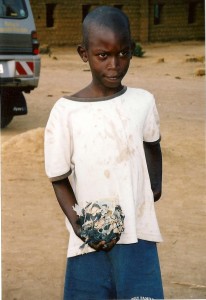A generally excellent piece of advice for writers is to write about what you know. It makes sense. How can you describe the atmosphere of the crowd at a football match during the taking of a crucial penalty unless you have experienced it for yourself? If you have lived through poverty, you don’t have to research it – you know what it feels like.
If you were bullied, bereaved, lonely or abused as a child, you can write about these things with a depth that can touch hearts.
All sorts of memories from your childhood can add depth to your writing, too, such as the feeling of freedom when playing with friends, the joy of a birthday surprise, the disappointment at being left out, the pride at winning a competition after working hard for it . . . nothing in life is wasted for a writer!
Bearing in mind that we are writing Christian stories for children and young people to encourage and inspire, here’s an exercise for you: Find yourself an evening on your own (or at least one uninterrupted hour), a pad of paper or laptop, and write a list of a dozen or so of your own childhood memories – they can be good, bad or ugly!
Here is my list in no particular order:
- Sewing patchwork alone on the stairs in the sunshine
- An adult embarrassing me in front of cousins I had only just met
- The dread of a new school term
- Winning on a slot machine at the fair (I went home with more money than I had taken!)
- Mum and Dad in the lounge with the door shut
- Walking miles to the sweet shop to buy a quarter of sweets (showing my age!)
- Many contented hours playing dolls with my sister (we used to pretend to talk to each other through our watches . . . we were way ahead of our time :-))
- Being told my cat had been put down. I cried in secret for weeks – Smokey was my best friend
- Reading under the bedclothes with a torch. Bedtime? Not if I hadn’t finished my book!
- Desperately wanting a real Sindy doll
- Stealing biscuits from the tin (me and my partner in crime/sister!)
- Going to church for the first time aged thirteen – it blew me away. God was in that place, reflected in the people. I felt like I had come home.
Once you have a list a bit like mine, pick one memory and write about it – not just what happened, but how you felt. Nothing really terrible happened to me in my childhood, but if you find it hard to write in the first person because of the nature of your memories, you might find it helpful to write in the third person, looking at what happened from a narrator’s point of view. Write as it comes to you, raw and without editing – just write and write and write until you are done. Write about the event, how you felt, what you sensed, how you feel about it now, the effects it still has on you, and what the Lord has done in your life through it.
Then, who knows – maybe you can use something of your past in your stories – it will bring you closer to your readers when they see that you understand their pain and their joy, and that there is hope for healing. Isn’t that what write for a reason is all about?
 Trust that helps! If it does, please comment below and share with your friends – together we can make a difference. 🙂
Trust that helps! If it does, please comment below and share with your friends – together we can make a difference. 🙂
Janet
PS The next Write for a Reason course starts April 13th. Let me know if you would like to join us!
